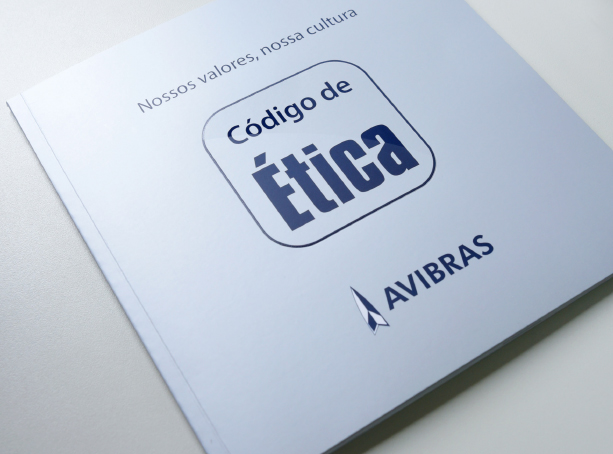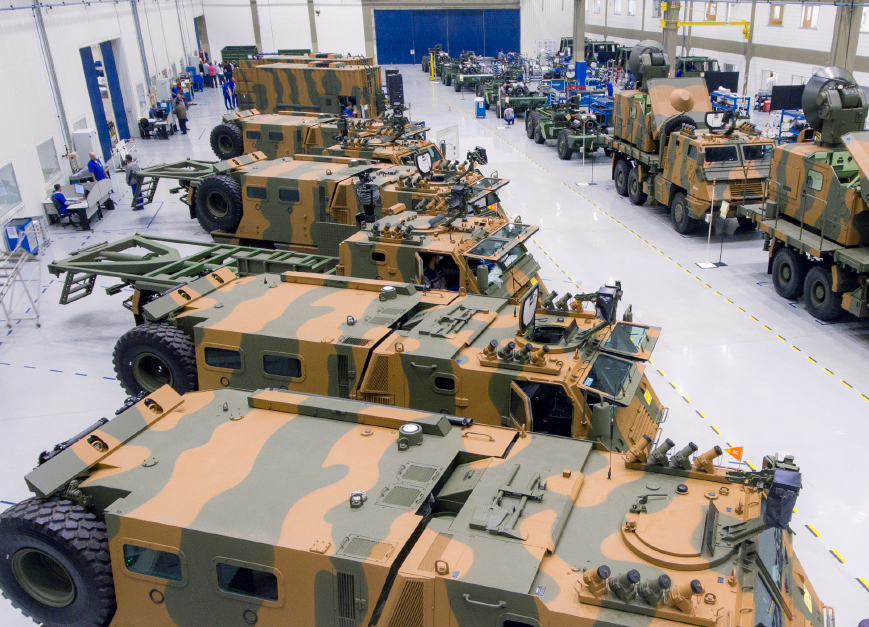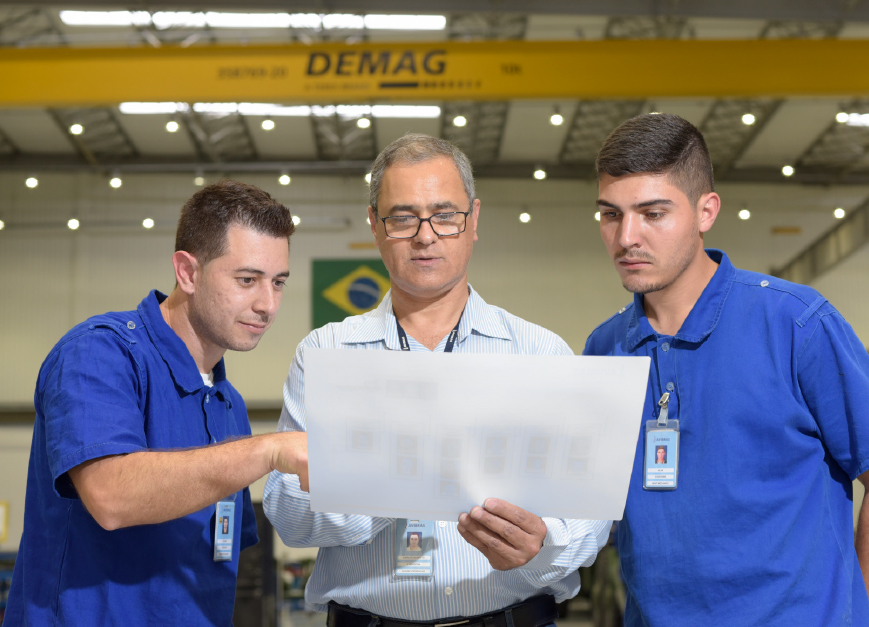Corporate
governance
103-2: Public policies | 103-3: Public policies

Avibras adopts processes, policies, norms, regulations and guidelines that constitute the Avibras culture. All the businesses are expected to observe the principles of impartiality and transparency, ethics, competitiveness, free from conflicts of interest, taking into account the present and future needs of society in the economic, environmental and social dimensions.
In 2018, the company consolidated the creation of the Competitive Intelligence area, leadership development programmes and Dedicated HR. Additionally, it extended the communication process with stakeholders, including employees and their families, shareholders, clients, local communities (in particular in São José dos Campos, Jacareí and Lorena), business associations, the federal government, banks and development institutions, technical partners, universities and academia, suppliers, technology parks, industrial development and innovation agencies and industry associations.
Tshe basis for the selection of these stakeholders is the map of target stakeholder groups prepared by the Sustainability Committee, which is also scheduling a cleaner production programme for the company in 2019. This will involve equipping the company with metrics and processes for economizing water and energy and reducing waste, in alignment with the Avibras por Excelência (AVPEX) Programme, another major achievement in 2018. 102-40 | 102-42
Externally, Avibras is a member of industry associations in Brazil and overseas, including the Brazilian defence and security industry association, ABIMDE, the national association of defence materials manufacturers, SIMDE, the Brazilian aerospace industries association, AIAB, and the Association of the United States Army (AUSA). In addition to participating actively in these industry associations, the company is seeking to boost its participation in associations and bodies that represent industry as a whole. In 2018, Avibras’ participation in the São Paulo State Federation of Industries (FIESP) and the São Paulo State Centre of Industries (CIESP) was also intensified, and included effective participation in sector committees. With a focus on technological development and innovation, the company also initiated its effective participation in the Brazilian Society for Knowledge Management (SBGC). 102-12 | 102-13
The company’s corporate governance structure has been establishing management models to enhance the internal controls overseen by the Audit and Risk Committee and the Internal Audit area, as well as the Avibras management model. The Avibras por Excelência (AVPEX) programme oversees the dimensions of leadership, people, innovation, value chain, culture and client which permeate the company’s continuous improvement process.
In 2018, the Code of Ethics was updated, reinforcing the ethical standards and behaviour expected of all employees at work and in external relations, regardless of hierarchical level. The document formalizes the company’s commitment to conduct business with integrity and to observe the policies, procedures and practices that ensure a corruption-free business environment. With a new editorial line and layout, the document includes a message from the CEO, a specific topic on the use of electronic information systems and the need for prior approval for external work on behalf of Avibras. The code is available in three languages (Portuguese, English and Arabic).
In 2018, 100% of the company’s employees received a copy of the Code of Ethics and signed the term of agreement with the new code. 102-16 | 205-2
The development of the company’s compliance model was initiated. This integrates a broad set of disciplines and processes to ensure compliance with legal and regulatory requirements, the policies and guidelines established for the business and for Avibras’ activities. It also addresses the identification and handling of any deviations or non-conformities that may arise.
Avibras also maintains a process designed to assess and mitigate risks. This is essential to maintain awareness of company values and identify potential risks and vulnerabilities. Furthermore, it boosts knowledge of the entire value chain and extends the concern with integrity and transparency to partners, suppliers and other stakeholders. Avibras operates in strict compliance with labour laws and the guidelines of institutions that promote the principle of respect for human rights.
Since its foundation, Avibras has applied a set of standards and procedures in the workplace that constitute an indispensable base for the operation. This comprises the set of processes, customs, policies, norms, regulations and guidelines that constitute the Avibras Culture

The Avibras governance structure comprises a three-member Advisory Board, the Audit and Risk Committee, the Ethics Committee and the Sustainability Committee. The Advisory Board and the committees are linked with Avibras’ CEO.
The role of the Audit and Risk Committee is to monitor and assess the internal control environment, the execution of internal and independent audits, track corporate risks and oversee the elaboration of the company’s financial statements.
It is the duty of the Ethics committee to analyse all reports of corruption, bribery, fraud, illegal or anti-ethical conduct, damage to the environment, questionable accounting practices or records, the misuse of company assets, all types of harassment and discrimination (gender, racial, social, religious etc). The Ethics Channel is managed by a third-party, ensuring full anonymity and confidentiality. Any stakeholder may make a report and monitor how it is being processed by means of a case number.
Complementing the governance structure, the Sustainability Committee has the mission of ensuring the materiality of the information and content in the Avibras sustainability report in line with the Global Reporting Initiative (GRI) guidelines. The report addresses topics that are relevant for company management and may influence stakeholder assessments and decisions.
Avibras also has an independent Internal Audit structure, reporting to the CEO, which supports the definition, elaboration and evolution of governance instruments.
João Brasil Carvalho Leite – CEO
Leandro Villar – Executive Vice President
Cynthia Benedetto – Executive Vice President
Almir Miguel Borges* – Chief Operating Officer (COO)
Carlos Alberto Macedo Cidade – Corporate Affairs Director
Fábio Nakagawa – Industrial Director
Fernando Ranieri – Engineering Director
Marcelo Ramon Ferroni – Project Management Director
João Brasil Carvalho Leite – President
Jean Jacques Moacy Rochebois Campello – Member
Pedro Angelo Vial – Member
Marcelo Sayon Sáfadi – Member
This body identifies, evaluates and analyses risks related to the company’s businesses, monitoring measures to mitigate these risks. It comprises internal and external consultants and is audited independently to ensure impartiality in the evaluation of processes.
The committee is responsible for ensuring the legitimacy, enhancement, and compliance with the Code of Conduct and the set of processes, customs, policies, norms, regulations and guidelines that make up the Avibras Culture.
The Sustainability Committee establishes tools to track company performance in the environmental, social and economic dimensions and to ensure compliance with international guidelines. It comprises employees from all company areas.
Procurement Committee
This body is responsible for establishing the real need for items included in the company budget.
Budget Committee
This committee validates the budget planning, executing the measures necessary to ensure it is carried out.
